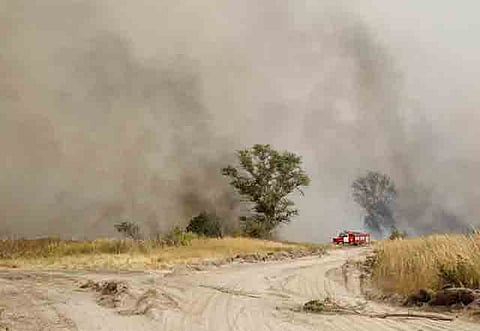Who can douse the fires?
Wildfires have caused chaos in Russia to the extent that it has had to suspend wheat exports

Russia, the country's top weatherman gloomily announced on Monday, is in the grip of its fiercest heatwave in a thousand years. Looking around, you can see what he means. The Kremlin is blanketed in thick smog from fires ringing the Russian capital; the sun, when visible, is a tiny orange orb; and a vast swath of central Russia, the world's largest country, is ablaze.
Temperatures fluctuate between 33 and 38 degrees Celsius and visibility is down to as little as 200 feet in places. One thing is sure: the summer of 2010 will be imprinted on Russians' minds for years ahead. Long inured to bitterly cold winters, when the mercury sometimes falls to minus 30 degrees Celsius, they have found the heat a much sterner adversary. Since mid-June, when the heatwave set in, more than 30,000 forest and underground peat bog fires have ignited across Russia's giant Eurasian land mass.
Such fires break out every year, but this summer has seen far more than usual, and of much greater intensity. The authorities have thrown enormous resources into extinguishing them, yet new fires have been starting almost as quickly as the old ones can be put out — the wind and the heat have seen to that. On Monday, more than 500 fires were raging across Russia, sending giant plumes of toxic smog laced with poisonous chemicals across Moscow, St Petersburg and other major cities.
In the past week, Muscovites have grown used to waking up with the smell of burning in their nostrils, an odour that wits have likened to that of a middling malt whisky. There is little escape from the smog, even in the city's famously deep metro system; it creeps into people's apartments overnight and seeps under door frames and through poorly insulated windows. The only blessing is that the city's notorious traffic jams have thinned, as visibility is so poor that driving is dangerous.
Exodus
It is no surprise that Moscow, a city of 11 million, is emptying out. Those who can leave do, and those who cannot leave lock themselves inside their Soviet-era tower block flats with all the windows firmly shut. On Sunday, 104,400 people boarded planes out of the city, a record number for 2010. Those left behind hang wet towels around their flats, don masks when outside, and take as many cold showers as they can handle.
The fires and the heat have exposed, not for the first time, how degraded Russia's public sector has become in the last decade, even as officials have grown richer on bribe-taking. When the moment of truth materialised, local people discovered that many of the rudimentary Communist-era fire safety systems had been quietly dismantled in the often unchecked rush to embrace a free market.
That, unsurprisingly, has sparked real public anger, and officials from Medvedev to Vladimir Putin, the Prime Minister, have had to concede how poor the official response was. Putin described how people had watched the flames approach their homes and frantically phoned local emergency services. Yet, instead of offering advice or assistance, the officials merely hung up, he said.
In Moscow, the authorities have set up more than 100 so-called "anti-smog" centres across the city. Yet the centres are a farce — many of them, including the one closest to the mayor's office, are not even equipped with air conditioning.
The city's morgues, which have capacity for around 1,500 people at any one time, are filling up quickly, with at least 1,300 places currently occupied. Russia's most senior doctor, Gennady Onishchenko, has urged employers to grant employees leave from work.
For his part, Putin, eyeing a possible return to the Russian presidency in 2012, has so far handled the crisis deftly. He has deflected blame away from himself by berating local officials for the poor response, and made a number of high-profile visits to the worst affected areas.
By contrast, Medvedev, the sitting president, has looked detached. He has issued dry directives and wrung his hands on state TV, projecting the impression of someone who is powerless before the elements. He has, in short, come nowhere near matching Putin's virtuoso, man-of-action performance. Russia's grain harvest and the thousands of ordinary citizens who have died in recent weeks may, as a result, not be the only casualties of this crisis.


